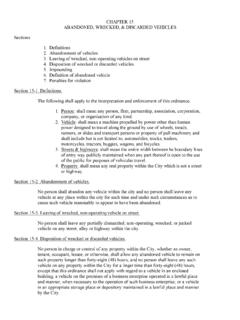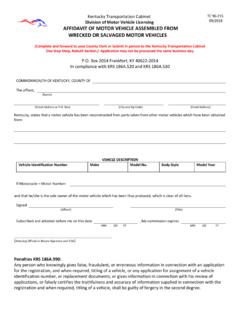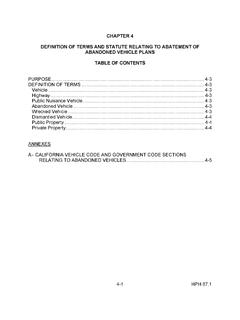Transcription of Chapter 12 JUNKED, WRECKED, ABANDONED PROPERTY*
1 Chapter 12 junked , wrecked , ABANDONED PROPERTY* _____ * Cross References: Buildings and building regulations, Ch. 5; code enforcement, Ch. 6; fire prevention, Ch. 8; litter on private property prohibited, 11-6, 11-7; construction wastes, 11-10; landscaping, Ch. 13; permitting foreign material in waterways, 15-22, 15-23; obstructions to waterways, 15-25--15-28, 15-37; planning and development, Ch. 19; handbills prohibited, 22-1; streets, sidewalks, bridges and other public places, Ch. 23; traffic and vehicles, Ch. 25; zoning, Ch. 27; streets, 23-21 et seq. State Law References: Seized, ABANDONED , wrecked or derelict property, Ch. 705; ABANDONED property of nominal value, supplemental procedure for removal and destruction, ; personal property found in public places, ; reporting of unclaimed motor vehicles, ; vehicles parked on private property, towing, _____ Art.
2 I. In General, 12-1--12-20 Art. II. ABANDONED and Inoperative Vehicles, 12-21--12-40 Art. III. Wrecker Service for Towing Vehicles, 12-41--12-77 ARTICLE I. IN GENERAL Sec. 12-1. Authority of police to seize. The police department is hereby authorized and directed to seize and reduce to the possession of the police department any automobiles, bicycles, or other vehicles, or any machinery or part, whether stolen, wrecked or otherwise lost or ABANDONED , which may be found upon any of the public streets or highways or parks of the city. The police may impound any boat, motor or skiff, whether stolen, wrecked or otherwise ABANDONED which may be found upon any of the public canals, lakes or other waterways, or upon the banks of such bodies of water, or the public streets, highways or upon any public ground or in any public building in the city. The police department is hereby authorized to reduce to the possession of the police department any gun, pistol, knife or other weapon, or any other property legally confiscated.
3 (Code 1964, 19A-1) Cross References: Police, Ch. 21. Sec. 12-2. Storage of seized or found property; time period. The police department shall keep and maintain adequate safes, storage rooms, garages, warehouses or other compounds where the bicycles and other vehicles, except motor vehicles, boats and other property seized or impounded under the provisions of this article shall be stored and kept for a period of six (6) months from the date of such seizure or impounding. (Code 1964, 19A-2) Sec. 12-3. Notice to owner of seizure; redemption procedure. During the storage period of six (6) months the police department shall make every effort to notify the owner of any such vehicles or other property that the same are being retained under the provisions of this article, and shall throughout such period of six (6) months permit the owner to regain possession thereof upon proof of ownership and upon payment of storage charges and costs connected with the seizure and storage of vehicles and other property.
4 (Code 1964, 19A-3) State Law References: Reporting of unclaimed motor vehicles, Sec. 12-4. Sale of unredeemed property; public notice. After the expiration of the period of six (6) months the mayor and/or chief of police shall publish in a newspaper of general circulation a description of such vehicles and other property, together with the date of seizure or taking possession thereof, and shall give notice that if such vehicles and other property be not claimed by the rightful owner thereof within thirty (30) days from date of publication, such vehicle or other property shall be sold at public sale at such place and in such manner as the custodian shall prescribe. The notice shall be published for two (2) consecutive weeks, two (2) publications being sufficient. (Code 1964, 19A-4) Sec. 12-5. Disposition of proceeds of sale. The proceeds of any sale of unredeemed property so made after deducting the costs of storage, advertising, selling and other expenses incident to the selling of such vehicles and other property, shall be turned over to the general funds of the city.
5 (Code 1964, 19A-5) Secs. 12-6--12-20. Reserved. ARTICLE II. ABANDONED AND INOPERATIVE VEHICLES* _____ * Cross References: Public works or police department to inspect wrecker storage facilities, 12-55; wrecker drivers to be approved by the police department and fire department, 12-57. _____ Sec. 12-21. Definitions. For the purpose of this article, the following terms shall have the following meanings: ABANDONED means: (1) Any vehicle located on public property or private property that does not have lawfully affixed thereto or displayed thereon a valid, unexpired license plate that permits its operation upon the highways of the State of Florida. (2) Any vehicle or part thereof that is left on public property continuously without being moved for a period of twenty-four (24) hours or more. (3) Any vehicle or part thereof located on public property illegally or in such a manner as to constitute a hazard or obstruction to the movement of pedestrian or other vehicular traffic on a public right-of-way, street or highway.
6 (4) Any vehicle or part thereof that has remained on private property without the consent of the owner or person in control of such private property, for a continuous period of twenty-four (24) hours or more. (5) Any "inoperative motor vehicle," which is defined to be any motor driven vehicle that cannot move under its own power due to defective or missing parts. Enforcement officer means the police chief, his agents or employees, a police officer, a police service aide, the code enforcement officer and assistants, or any other person designated by law, charter, ordinance, or resolution to enforce the provisions of this article of the City Code. Owner means the last known record title holder to a vehicle according to the records of the Florida Department of Motor Vehicles. Parts means all component parts of a vehicle that are in a state of disassembly, or are assembled with other vehicle component parts, but which, in their state of assembly, do not constitute a complete vehicle.
7 Person means all natural persons, firms, partnerships, corporations, and other entities. Vehicle means any motor vehicle as defined in Florida Statutes, automobile, motorcycle, truck, trailer, semi-trailer, truck-tractor, bus, school bus, house car, motorbicycle, wagon, farm machinery, moped and every device in, upon, or by which any persons or property are or may be transported, every type of equipment on wheels. (Code 1964, 14-12; Ord. No. 1387, 1, 4-2-86; Ord. No. 2329, 1, 7-28-2004) Cross References: Definitions and rules of construction generally, 1-2. Sec. Control of parking facilities subject to public parking easements. (a) Private property means all privately owned property that is not classified within the definition of public property. (b) Public property means any public right-of-way, any property which has been dedicated to, conveyed to, or over which the following have an easement (but only during such times such easement is not reserved for private use in accordance with this section): the state, county, city, community redevelopment agency, safe neighborhood district, or other governmental entity.
8 (c) Where an easement for parking has been dedicated or granted to the public or to a governmental entity, the police department (upon an application by the landowner approved by the governmental entity enjoying the easement or with jurisdiction if the easement is to the public) may restrict public usage during certain times within a twenty-four-hour period. During such determined periods of public use, the property shall be public for purposes of this article and during time periods reserved for private use the property, shall be considered private property for the purposes of this article. (d) In considering whether to approve a restriction on the hours of public use for any parking area over which the public has an easement, the police department, acting with the advice of the planning, zoning and economic development department and fire department, shall consider: (1) The character and type of surrounding uses, both on the property subject to the easement and on the surrounding property; (2) Whether the restriction would further the city's interest in crime prevention; (3) The hours of typical and permitted operation of the property subject to such easement; (4) The hours of typical and permitted operation of the property immediately surrounding the property subject to the easement; (5) The city's development approval conditions, if any, for the property subject to such easement, and the property immediately surrounding same.
9 (6) Any reported dispatch calls or responses by law enforcement, fire prevention, or emergency medical transport agencies for the six (6) months preceding a request to restrict the hours of public use; (7) Whether the restriction would further the public health, safety, and welfare in terms of any lessening or preventing of adverse effects caused by noise, litter, routine gatherings of numbers of persons, property damage, and the like during the time the parking facilities are currently being used for public parking; (8) Whether the parking facility is reasonably in use by the public during the times for which the restriction is requested; and, (9) Whether and to what extent approving the restriction would not further economic development or redevelopment interests. (e) The city administration may initiate an application to restrict the hours of public use of a parking easement pursuant to this section.
10 (f) The police department may approve an application to restrict hours of public usage of parking areas for a limited term not to exceed one (1) year, after which initial term the restriction may be renewed for another one-year term. The police department may also cancel an approved restriction or modify same at any time upon consideration of the above factors and shall advise the owner of the land subject to the easement of such decision in writing. (g) Upon the expiration or termination of the restriction, the owner of the property subject to the easement may apply for a new restriction. (h) When the use of parking spaces within an easement to the public or to another governmental agency has been restricted pursuant to this section, the owner shall be able to erect signs approved by the police department advising the public that the area is to be used by the public during certain hours, and at all other hours public parking may not occur.












